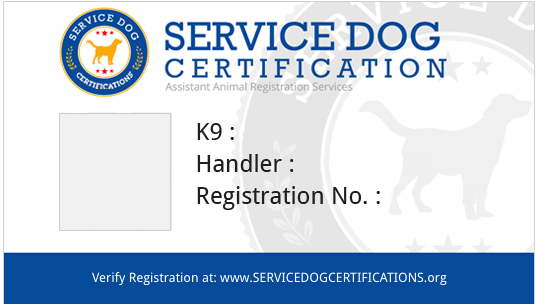Home Page › Blog › Registration Requirements: Service Dog – Certification
Registration Requirements: Service Dog – Certification

Any dog lover will tell you that the benefits of sharing your life with a canine companion are far too numerous to name. For people afflicted with certain disabilities and conditions, those benefits reach even further. Thanks to the American with Disabilities Act (ADA) of 1990, service dogs are so much more than just pets. These faithful companions provide the support needed by many individuals to live independently. From seeing eye dogs that are trained to guide the blind, dogs that can detect seizures before they strike and warn their owners, and canines that can sense their handlers’ blood sugar levels to highly trained dogs that help their owners perform numerous day-to-day tasks and those that aid soldiers who have returned from war, there is no limit to the types of roles these incredible dogs can fill.
How exactly does one go about registering a service dog? Let’s take a closer look at service dog registration requirements.
- Understand what a service dog is and what it does.
- Train the dog to provide a service for the handler/owner.
- Register your dog with a reputable organization.
- Get your service dog ID card and vest.
- Know your rights.

What Is a Service Dog?
A service dog is a dog that has been specifically trained to perform certain tasks or do work for someone with a disability. Some of the most common tasks including guiding the blind, alerting deaf people, protecting someone who is having a seizure, pulling a wheelchair, and reminding someone to take prescribed medications. Under the ADA, in order for a dog to qualify as a service animal, it must undergo extensive training to meet the specific needs of a person who is disabled. They are classified as working animals rather than pets, and they are afforded several protections under the law.
Training Requirements
Training is what distinguishes a pet from a service animal. Whether you have your dog professionally trained or choose to do the training yourself, you can register him or her as a service dog upon completion. The United States does not have guidelines in place for how much time you need to spend training a service dog, however, international standards recommend roughly 120 over the course of six months. Many dogs spend one to two years in training, and at least 30 hours should be spent training in public to help the dog learn how to work in distracting situations.
Once you feel that the dog has been thoroughly trained, you need to put him to the test. The Public Access Test provides evaluation criteria for service dogs. In order to pass, the service animal must not show aggressive behavior or beg for food or affection while being tested. The animal must also remain calm and avoid hyperactivity while in public and respond to basic obedience cues.
Registration and Equipment
In the United States, service dog registration is not required by law. However, registering your dog makes it much easier to ensure that your rights will be respected by businesses, landlords, etc. Registering your service dog online is easy and takes just a few minutes. Simply enter your name, your dog’s name, your email address and the type of service your dog performs.
Once your dog has been registered, it is a good idea to invest in certain equipment. While service dog identification is not required by law in the US, carrying a service dog ID card for your service animal could help you avoid some sticky situations. Service dog vests are also a good idea as they clearly show that your dog is working.
Service Dog Rights

Trained service dogs are afforded several rights under the ADA. They are allowed to enter public places where pets are not allowed, such as restaurants, malls, and hotels. Service dogs are also permitted to accompany their handlers on airplanes. Businesses may ask if a dog is a service dog and what tasks the dog performs. They may not, however, ask about the handler’s disability, require special identification for the dog or refuse admittance. Businesses that prepare or serve food must allow service dogs in public areas. The ADA supersedes local and state health codes.
If a service animal is out of the owner’s control and posting a direct threat to the safety and health of others, the business owner does reserve the right to ask the owner to remove the animal from the premises.
Once a service dog has been properly trained, registration is easy. Service dogs are largely self-regulated in the United States, and while federal law protects them and their owners, the requirements are much less rigid than many people would imagine. While identification and vests are not required by federal law, these things are recommended because they may make dealing with the public easier when you have a service animal.
About the Author: The writing team at Service Dog Certifications is made up of folks who really know their stuff when it comes to disability laws and assistance animals. Many of our writers and editors have service dogs themselves and share insights from their own experiences. All of us have a passion for disability rights and animals.
104 comments
Leave a Reply Cancel reply
Latest Posts

How to Bring a Service Dog to Disneyland
Trained service dogs are more than welcome to join their handlers at Disneyland. In this guide, we’ll explain Disneyland’s policies and give practical advice for bringing a service dog to Disneyland for the first time. Disneyland’s Service Dog Policies The Magic Kingdom is happy to welcome trained service dogs across most park locations! They kindly […]

Read More

Can Dogs Eat Tomatoes?
Yes! Dogs can safely enjoy tomatoes, but there are a few risks to be aware of so you can feed your dog responsibly. Fully ripe tomatoes (without the stems and leaves) can actually have nutrients that are good for your pup. Tomatoes have chlorogenic acid, an antioxidant that can have anti-inflammatory effects in cells. They’re […]

Read More

Can a Primary Care Doctor Write an ESA Letter?
Your family doctor, also called a primary care physician (PCP), can write a letter recommending an emotional support animal. We’ll explain what legally gives them that ability and explore what better options might be available for you. Why are Physicians Able to Write an ESA Letter? To turn your pet into an emotional support animal, […]

Read More







i am teaching two dogs for me because i have pots and eds so anyone know any task i can teach them
Hello
I want to fly to Italy with my 8 month old Labrador as a PSD and would like to know if there are special requirements?
In order to have a legitimate PSD, you would need to train your dog to perform tasks that help you with your emotional or mental disability. You may talk to your therapist to identify what kind of tasks your dog could help you with. The training may take some time and includes public access tests. Only once the training is complete you can call your labrador a psychiatric service dog. You may find this article on how to get a psychiatric service dog interesting: https://www.servicedogcertifications.org/how-to-get-a-psychiatric-service-dog/
What would happen to someone if they are faking a service dog to stay in a house so they dont get kicked out but the dog is well behaved? is it illegal?
Because , my friend is doing this and idk if it is legal for her to be doing it i just want to inform her.
What your friend is doing is illegal. tell your friend to stop pretending the dog is a service animal. It is a classic A felony to pretends your pet is a service animal.
Can I register my dog to be a service dog for someone else
No, a service dog is specifically on duty for one person only. The service dog must be registered under the name of the person with the disability and the dog must perform tasks that this individual could not achieve themselves in times of need. You may find this article on how to register a service dog interesting https://www.servicedogcertifications.org/how-to-register-your-dog-as-a-service-dog/
first of all lets get this straight it isn’t required to register your dog as a service dog. There is no official certification or registration for a service dog. Your dog can be a service dog for someone else if you are the handler. There are some disabilities that the person can’t handle the dog themselves think dementia. A service dog can alert you to them wondering off from you also they can help keep them close to you. Registering does help in some cases and may make it easier but it isn’t required this is repeated a number of times on this website. The two questions that are ask is this dog a service dog. two answers yes or no. What is it service? This is where the answer truly tells if it is a service dog or not. Medical alert doesn’t require an explanation but if you feel that this is the correct answer for your dog for the someone else then your dog can be a service dog for that person.
No it is not. https://www.propertyware.com/blog/states-fake-service-dog-laws/#Texas
How to train a mini Dashhound to detect my Low’s & Highs with my Diabetic 2 Issues On My Own ? My Puppy Was Born 12/3/2020 . So I’ll Be Getting Her When She Is 8 Weeks Old. She Was Born In Coude’Alene, Idaho, I Live In OREGON . I’m Going To Pick Her Up And Travel By AmTrack Back 2 Oregon . But I Need To Know What Can I Do So She Can Travel On Any Flights 🛫,Or Taking Greyhound Trips In The Future?
Airlines have been announcing they won’t accept emotional support pets nor service dogs in flights , is this legal ? What do they mean?
Yes, unfortunately, that is legal. The U.S. Department of Transportation has decided that airlines are no longer required to accept ESA’s. Fortunately, there are still a couple of airlines that choose to accept ESA’s. I found an updated list of which airlines still allow emotional support animals over on another website:
https://esadoctors.com/airlines-allowing-emotional-support-animals/
I mean i would just pay and say it a working service dog and if i get hurt bc i did have my dog it your falt
I have a sweet goldendoodle with an excellent temperament and very affectionate. I would like to take him to autism parks and nursing homes (public places). One site told me I probably need to register him as a service animal. I am confused as to service animal vs ESA registration. I read the information below on this site, but it indicates I cannot bring into a public place. What would my best option be? Can anyone guide me please. Thank you for your time.
Your Goldendoole sounds like an awesome dog! I suppose you’re thinking of making him a Therapy Dog. A TD provides comfort and support to patients in hospitals, nursing homes, or any other communities that require calming, psychological, and physiological healing. That’s a very noble cause; I’m sure your dog will bring lots of joy to the patients. You may find this article on Therapy Dogs interesting – https://www.servicedogcertifications.org/guide-to-therapy-dogs/
I have a miniature schnauzer that’s extremely clairvoyant. She was not trained for this but she alerts me about five minutes before I have a seizure or a TIA. I also have PTSD she will try to lay across me. She’s completely obedient train for I have trained many dogs for search and rescue. Her only problem is when someone reaches out and tries to pet her she wants to love all over them. I have not registered her as a service dog yet, didn’t know how to do that. She’s been alerting on me for three years now. I was in the doctor’s office and started having a TIA and she alerted and then left me and brought back a nurse. Would she qualify as a service dog?
Your miniature schnauzer sounds like a natural service dog! And she would qualify as your service dog. However, does her interaction with other people affect her focus on the job? The concern would be that if you were to have an episode while she’s interacting with someone else, would she still be able to alert you? You may need to work on her skill to focus on you only and find ways to agree on downtime when you’re in a safe environment.
You may find this article on the requirements of a service dog interesting https://www.servicedogcertifications.org/service-dog-requirements/
My dog was not specifically trained as a service dog but has had extensive obedience, hunting and tracking training. Over the last few years a back injury (VA Disabled) has progressed to a debilitating point. My dog will fetch and retrieve to hand on command. He will pick up almost anything I drop or cannot reach. I will mention that he is very sociable and non-aggressive to humans and animals. Does not beg and only barks to warn me of hazards. Would this qualify him as a service dog? I’ve only thought of this recently as certain tasks have gotten more difficult to perform.